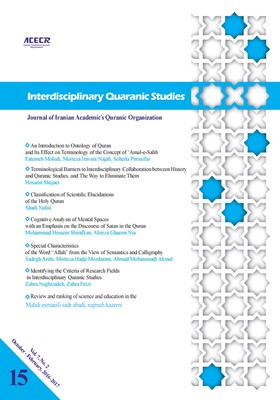An Introduction to Ontology of Quran and Its Effect on Terminology of the Concept of ‘Amal-e-Sālih
Subject Areas :fatemeh moulodi 1 , morteza iravani 2 , sohila piroozfar 3
1 - Ferdosi University
2 - Ferdosi University
3 - Ferdosi University
Keywords: Semantic Relations ‘Amal-e-Sālih, Quran Ontology,
Abstract :
the terminology of the Quranic term ‘Amal-e-Sālih remains a challenging topic for Islamic researchers. Semantic studies on the term are mostly based upon lexical and idiomatic analysis as well as individual understandings made by the scholars and interpreters out of Quran’s verses or other Islamic sources, and the process of discovering the terminology of the term is rarely pursued systematically. While Semantics, as a branch of the fast-developing science of Linguistics, has experienced much improvements in the past decades and it is necessary to follow the systematic procedures for semantically discovering the Quranic terms synchronous with the advancement of this knowledge. As proposed by contemporary Semantics, Terminology discovering might be presented at three levels of Term, Context, and Discourse. This paper tries to present semantic analysis of the Quranic term of ‘Amal-e-Sālih on the level of discourse by introducing and applying Ontology [on this Quranic concept]. Ontology as a new tool in computer and information technology, specifies the key words involved in a domain of knowledge, as well as their relationships and therefore standardizes the meanings. In the proposed Quranic Ontology, by considering several semantic relationships (generalization, procedure, and combination), the connections between related concepts are presented in a suitable template in the form of network diagrams, simple arrows, dots and lines. It will be witnessed that applying Ontology in semantic analysis of the level of discourse for the term, ‘Amal-e-Sālih clearly offers a new understanding of this Quranic concept, which can bring about new educational approaches and outcomes.
احمدي، احمد (بیتا). دستور زبان يا صرف و نحو. مشهد: باستان.#
آسوشه، عباس، مهر آسا، شهره، خطیبی، تکتم، و خاکشو سعادت، پریسا (1390). هستان نگاری: روش شناسیها، ابزارها و زبانهای توسعه. تهران: دانشگاه تربیت مدرس، مرکز نشر آثار علمی.#
ایزوتسو، توشیهیکو (1388). مفاهیم اخلاقی- دینی در قرآن مجید. ترجمه فریدون بدرهای، تهران: نشر فرزان.#
ایزوتسو، توشیهیکو (1393). خدا و انسان در قرآن .ترجمه احمد آرام، تهران: شرکت سهامی انتشار.#
بنت الشاطي، عائشه عبدالرحمن (1376). اعجاز بياني قرآن. ترجمه حسين صابري، تهران: شركت انتشارات علمي و فرهنگي.#
بنت الشاطي، عائشه عبدالرحمن (بیتا). التفسير البياني. قاهره: دارالمعارف.#
پالمر، فرانک (1385). نگاهی تازه به معنیشناسی. ترجمه کورش صفوی، تهران: ماد.#
پرچم، اعظم، و شاملی، نصر الله (1386). دیدگاه قرآن پژوهان درباره اشتراک لفظی و معنوی در قرآن و واژگان وجوه و نظایر. تحقیقات علوم قرآن و حدیث، 2(4)، 67-86.#
پیکره قرآنی فرقان (1392). پروژه ایجاد و انتشار زیر ساخت وب معنایی برای قرآن کریم، بازیابی شده در 12 اسفند 1394. دستیابی از #http://wtlab.um.ac.ir/linkdata/quran/ontology.html
ژاکوب، الین ک (1384). هستیشناسیها و وب معنایی ،ترجمه شیخ شعاعی، فاطمه، فصلنامه کتاب، 64، صص 189-194.#
صفري، مهدي (1383). مدلسازي مفهومی در بازنمون رسمی دانش: شناختی از هستی شناسی در هوش مصنوعی و نظام هاي اطلاعاتی. اطلاع شناسی، 1(4)، 75-104.#
صنعتجو، اعظم، و فتحیان، اکرم (1390). مقایسه کارآمدی اصطلاحنامه و هستیشناسی در بازنمون دانش (طراحی و ساخت نمونه هستیشناسی اصفا). پژوهشنامه کتابداری و اطلاعرسانی، 1(1)، 219-240.#
فالک، جولیا اس (1372). زبانشناسی و زبان .ترجمه خسرو غلامعلیزاده، مشهد: آستان قدس رضوی.#
فرشيد ورد، خسرو (1386). دستور مفصل امروز .تهران: سخن.#
فولیکه، پل (1378). هستیشناسی: بحث وجود . ترجمه یحیی مهدوی، تهران: مرکز نشر دانشگاهی.#
لیدز (بیتا). بازیابی شده در 12 اسفند 1394. دستیابی از http://corpus.quran.com/ontology.jsp#
منجَّد، نور الدين (1422). الترادف في قرآن الكريم. دمشق: دارالفكر.#
وب معنایی (بیتا). بازیابی شده در 12 اسفند 1394. دستیابی ازhttps://www.w3.org/standards/semanticweb/#
ویکیپدیا، دانشنامه آزاد (بیتا). بازیابی شده در 12 اسفند 1394. دستیابی از
https://en.wikipedia.org/wiki/Ontology_(information_science)#Published_examples#
یعقوبنژاد، محمد هادی، حری، عباس، شمس فرد، مهرنوش، حسینی بهشتی، ملوکالسادات، و علیپور حافظی، مهدی (1390). استفاده از اصطلاحنامهها در محیط وب. کتاب ماه کلیات، 165، 10-21.#
#Gruber, T. R. (1993). A Translation Approach to Portable Ontologies, Knowledge Acquisition, 5 (2),199–220.
Guarino, N., Oberle, D., Staab, S. (2009). What is an ontology? Handbook on Ontologies. International Handbooks on Information Systems. Berlin Heidelberg: Springer-Verlag.#
Harrag, F., Al-Nasser, A., Al-Musnad, A., Al-Shaya, R., Salman Al-Salman, A. (2014). Using association rules for ontology extraction from a Quran corpus. presented at 5th international conference on Arabic Language Processing.
Iqbal, R, Aida, M., Zulkifli, Y. (2013). An experience of developing Quran ontology with contextual information support. Multicultural Education & Technology Journal, 7(4), 333 -343.
Katifori, A., Halatsis, C., Lepouras, G., Vassilakis, C., Giannopoulou, E. (2007). Ontology visualization methods-a survey. ACM Computing Surveys, 39(4), 10:1-10:43.
Schuyler, P. L., Hole, W. T., Tuttle, M. S., Sherertz, D. D. (1993). The UMLS Metathesaurus: representing different views of biomedical concepts. Bulletin of the Medical Library Association, 81(2), 217-22.
Sherif, M. A., Ngomo, A. N. (2012). Semantic Quran: A Multilingual Resource for Natural-Language Processing. Special Issue of the Semantic Web Journal, Multilingual Linked Open Data (MLOD) Data Post Proceedings.
Sowa J. F. (2000). Knowledge Representation: Logical, Philosophical, and Computational Foundations. Brooks Cole Publishing Co., Pacific Grove, CA.
Uschold, M., Grunniger, M. (1996). Ontologies: Principles, Methods, and Applications. Knowledge Engineering Review, 11(2), 93-155.
Yauri, A. R., Rabiah, A. K., Azreen, A., Masrah A. A. (2012). Quranic based Concepts: Verse Relations Extraction Using Manchester OWL Syntax. in Proceedings of the International Conference on Information Retrieval & Knowledge Management (CAMP), 317- 321.
Yauri, A. R., Rabiah, A. K., Azreen, A., Masrah A. A. (2013). Ontology Semantic Approach to Extraction of knowledge from Holy Quran. in proceedings of the 5th international conference on Computer Science and Information Technology (CSIT).


